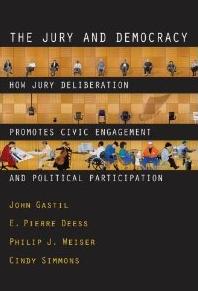When a jury summons arrives in the mail, few people are thrilled. Some try to get out of jury duty. But once they’re in the courtroom, most jurors come to appreciate the experience. And, says John Gastil, they are likely to become more civically engaged as a result.
“What we find is that being on a jury matters,” says Gastil, professor of communication and political science. “Citizens who deliberate on a jury are more likely to vote in any future election.” Gastil shares his findings in The Jury and Democracy (2010, Oxford University Press), co-authored with Department of Communication lecturer Cindy Simmons, E. Pierre Deess, and Philip J. Weiser.
The book is the culmination of a ten-year study that tapped the extensive data available on voter participation. The authors were curious to learn whether compulsory civic engagement makes citizens more likely to vote. That led them to study jury service, a well-documented example of required civic engagement.

After completing a pilot study of jurors in Washington’s Thurston County, the researchers went national, gathering additional data in Colorado, Louisiana, Nebraska, North Carolina, Ohio, Texas, Louisiana, and King County, Washington. Their challenge was to review case files for jury trials over a two-year period, gathering jurors’ names and matching those to voting records from before and after jury service.
“You need the perfect county,” says Gastil. “You need it to be large enough to have a critical mass of jurors, but you don’t want too many people, since you need to match names with voting records.” For exact matches, he explains, you also want a county that uses middle names or at least middle initials in their voting records. And it helps if citizens in that county tend to stay put.
The team reviewed the voting records of more than 13,000 individuals who had participated in jury service, factoring in variables such as the trial’s length, the seriousness of the crime, the length of deliberation, and the verdict. They also tracked jurors who did not have a chance to deliberate, either because they were alternates or due to a mistrial, settlement, or plea change. They found a statistically significant 4 to 7 percent increase in voter participation among criminal-trial jurors who had previously voted less than half the time—but only if a juror had the opportunity to deliberate.
“None of the other factors mattered,” says Gastil. “Deliberation was key.” For juries deliberating on multiple charges, the effect was more pronounced. “Every charge adds about 1 percent to the likelihood that the juror will vote in a future election,” explains Gastil.
The team explored more subtle impacts of jury service through panel surveys of jurors in King County. A few results stand out for Gastil. Asked whether the judge thanked them for their service, many jurors remembered details of the judge’s comments. And yes, their civic engagement tended to increase more when their judge showed appreciation. “That little gesture—thanking the jurors—has a civic ripple effect,” says Gastil. “It keeps people more engaged as citizens.”
Also noteworthy was that the quality of the deliberation was not an important variable for most jurors. But for those who described themselves as homemakers, it was absolutely critical. “If they had an exceptional experience and were satisfied with what they did, they become very engaged in politics,” says Gastil. “For this group, the quality of the jury experience becomes statistically significant.”
All of these findings lead to one overarching conclusion: juries are important not only for those being tried but for the jurors themselves, and more broadly, for society.
“Such civic benefits cannot be taken for granted because the jury system is perpetually under attack,” says Gastil, who points out that recent legal reforms have reduced the size and frequency of jury trials in the U.S. Many other countries have scaled back or eliminated juries over the past century.
“With widespread public concern about stagnant voter turnout, low levels of social capital, and limited civic voluntarism in American society, the jury could prove a bulwark against further civic erosion,” argues Gastil. “Our hope is that our research demonstrates to policymakers that the jury plays a valuable role in sustaining a healthy civic culture.”
For more about this research, visit jurydemocracy.org.
More Stories

AI in the Classroom? For Faculty, It's Complicated
Three College of Arts & Sciences professors discuss the impact of AI on their teaching and on student learning. The consensus? It’s complicated.

A Sports Obsession Inspires a Career
Thuc Nhi Nguyen got her start the UW Daily. Now she's a sports reporter for Los Angeles Times, writing about the Lakers and the Olympics.

A Healing Heart Returns
In February, the UW Symphony will perform a symphony that Coast Salish elder Vi Hilbert commissioned years ago to heal the world after the heartbreak of 9/11. The symphony was first performed by the Seattle Symphony in 2006.